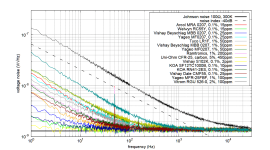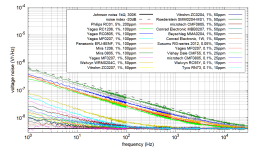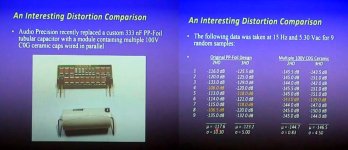Thanks for the link. I will need to study this at leisure!
A quick glance shows that the 2sk117GR I have in my drawer are better than I thought 🙂
Now I just hope they are not fakes haha. Can't remember when or where I got them. I think a Dutch surplus store, probably 10 years ago.
A quick glance shows that the 2sk117GR I have in my drawer are better than I thought 🙂
Now I just hope they are not fakes haha. Can't remember when or where I got them. I think a Dutch surplus store, probably 10 years ago.
I don't think a "standard" DIY'er has the equipment or skills to do resistor noise measurement properly?
https://dcc.ligo.org/public/0002/T0900200/001/current_noise.pdf
I guess the resistor is the most linear component we have. Compared to e.g. a transistor.......
I think for myself to reduce noise the time spent is best done on layout of amplifier in chassis, how wires are routed, power supple etc......
But interesting scientifically topic for those who will and have the skills to measure and compare noise generated by various brands of high quality industrial resistors (if one brand comes out on top I could be tempted to use those).
A resistor can also pickup noise just by its size if someone is tempted to use some very special purpose resistors for audio 🙂
The same with capacitors. Very large film-caps can pickup noise even that it have better specs compared to a smaller ones.
Compact SMD circuits are not that bad i think.......regarding noise....
https://dcc.ligo.org/public/0002/T0900200/001/current_noise.pdf
I guess the resistor is the most linear component we have. Compared to e.g. a transistor.......
I think for myself to reduce noise the time spent is best done on layout of amplifier in chassis, how wires are routed, power supple etc......
But interesting scientifically topic for those who will and have the skills to measure and compare noise generated by various brands of high quality industrial resistors (if one brand comes out on top I could be tempted to use those).
A resistor can also pickup noise just by its size if someone is tempted to use some very special purpose resistors for audio 🙂
The same with capacitors. Very large film-caps can pickup noise even that it have better specs compared to a smaller ones.
Compact SMD circuits are not that bad i think.......regarding noise....
Ok, yes I see!
I know the brands but I don't think I know the series or the formfactor etc. on those that have lowest noise......but this could be investigated.
I know the brands but I don't think I know the series or the formfactor etc. on those that have lowest noise......but this could be investigated.
From 100 Hz and up.......not that much of a difference?
And below 100 Hz.......I guess PSU noise will be dominant?
And below 100 Hz.......I guess PSU noise will be dominant?
You should seek out Bruce Hofer - designing analog circuits with ultra-low - lots of good material.I don't think a "standard" DIY'er has the equipment or skills to do resistor noise measurement properly?
https://dcc.ligo.org/public/0002/T0900200/001/current_noise.pdf
A resistor can also pickup noise just by its size if someone is tempted to use some very special purpose resistors for audio 🙂
The same with capacitors. Very large film-caps can pickup noise even that it have better specs compared to a smaller ones.
Compact SMD circuits are not that bad i think.......regarding noise....
The 1206 size SMD is still a relative “sweet spot” in terms of price and availability for precision resistors. And is a good choice for thermal release as any smaller is a compromise.
Attachments
Definitely will.Perhaps worth it to read the whole paper. I haven't yet, but this one shows that not all are created equal, at higher frequencies.
I think it is safe to conclude that:
a. not all resistors are created equally
b. some measure higher noise in the audible range than others
c. although 3rd harmonics seem to dominate, the levels are not the same
So, perhaps my 24 resistor test setup was not so daft after all 😎
a. not all resistors are created equally
b. some measure higher noise in the audible range than others
c. although 3rd harmonics seem to dominate, the levels are not the same
So, perhaps my 24 resistor test setup was not so daft after all 😎
Yes, but I doubt it will make a difference on a final amp when we make the usual distortion / noise measurement using ARTA/REW etc. assuming normal high quality resistors were used?
Talking about noise there is a Formula 1 show few hundred meters from where I live. They play with an old RB7 Red Bull racer (probably V10 engine).
https://www.redbull.com/dk-da/events/showrun
https://www.redbull.com/dk-da/events/showrun
I went over there.........but stupid I did not bring any hearing protection........so I went quickly back again. I did not have a ticket either......so......
Those cars are too loud.......I got a picture! ......it is far above the "pain-limit".....
But that is not Johnson noise.......so back to Johnson noise 🙂
Those cars are too loud.......I got a picture! ......it is far above the "pain-limit".....
But that is not Johnson noise.......so back to Johnson noise 🙂
Attachments
- Home
- Amplifiers
- Pass Labs
- PASS preferred resistors




